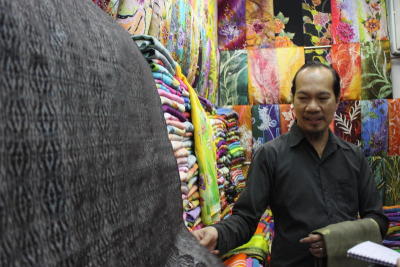Locals strive to keep traditions alive … some do it with a little twist. WAN NOR Affifah Wan Azizi loves Terengganu so much that she created a delicacy and named it after the east coast state.
After years of selling serunding Kelantan (Kelantanese meat floss) with her mother, Hajjah Umar Bidah at Pasar Payang in Kuala Terengganu, the entrepreneur decided to give the treat a closer-to-home flair and succeeded in creating a new local delicacy – serunding Terenggannu.
Affifah believes that she is the first person to have created serunding Terengganu, and so far, no one has claimed otherwise.
“I just wanted to give Terengganu something to be proud about and that’s why I created this,” said the 22-year-old entrepreneur.
Compared to the salty, spicy serunding Kelantan, Affifah’s serunding Terengganu is finer, less salty and sweeter. The latter is also a hit among the locals who were initially skeptical with Affifah’s decision to “reinvent” a traditional treat.
“I am very happy with the response that serunding Terengganu has received from my customers. It took a while for them to warm up to the new delicacy though,” said Affifah who hopes that one day her creation would become a local specialty; like keropok lekor.
She also wishes that the younger generation in Terengganu would be more interested in learning and upholding their east coast traditions.
“I hope the new generation would actively keep our traditions alive. I hope I have set a good example for them to follow,” Affifah said.
Another Terengganu native who is proud of her heritage is Zaipah Abdullah Hamid who dreams to see batik flourish in the modern era while maintaining its old-school techniques.
The 47-year-old entrepreneur runs KMZ Batik & Songket in Pasar Payang with her husband and their two children.
“My son handles the marketing while my daughter designs the batik pieces,” she shared.
In fact, the pieces sold in their store are all handmade, and Zaipah hopes to keep it that way.
“I want to reintroduce a generation of batik craftsmen who create with their hands, and not rely on machinery.
“The artwork is more meaningful when it’s done on your own,” she added.
Zaipah is the second generation in her family to sell batik. Her father, who moved to Terengganu at the age of 17, started the very first batik and songket business there.
She encourages her children to take over the business and expects them to upkeep the tradition for more generations to come – just like how she took over the business and learned the craft from her father.
“My husband is gradually passing his skills to our children – from weaving songket to creating batik.”
Zulkifli Che Muda, a worker from Qistina Silk Shop in Pasar Payang believes that the long hours spent on the intricate details of a single batik artwork is worthwhile.
He said, “You can never get exact copies of hand-drawn batik pieces, and that makes it all the more special.”
Meanwhile, Zaipah intends to expand the artistry on a larger scale. The ambitious batik practitioner hopes to collaborate with the government in a programme to educate school about the batik culture.
“It won’t be like school where you have to follow a rigid syllabus. You can learn how to weave songket in my programme at your own pace,” Zaipah elaborated.
She also stated that an incentive to participating in the programme is the rush of satisfaction and pride upon completing their artwork.
“I don’t want this craft to die out, and I will teach anybody – regardless of ethnicity – all that I know.”



Tell us what you think!